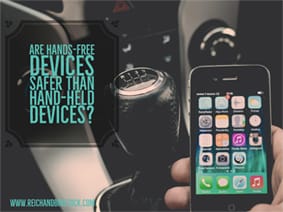CAR ACCIDENTS & INJURIES
Home > Houston Personal Injury Lawyer > Houston Car Accident Lawyers > Study: Are Hands-Free Devices Safer Than Hand-Held Devices?
Are hands-free devices safer than hand-held devices?

The death toll of people who are killed by distracted drivers continues to increase. According to the National Highway Traffic Safety Administration 391,000 people are injured and 3,477 people are killed in accidents involving distracted drivers every year in the United States. Some states prohibit motorists from using hand-held devices; however, hands-free cellphones are still legal in all states. Despite marketing encouraging drivers to switch from using hand-held cellphones to a hands-free cellphones, many people are wondering whether the hands-free model is really any safer to use.
Texas texting-while-driving ban signed
Although it is not illegal under Texas law for drivers to talk on their hand-held cellphones while driving, in June 2017 the governor signed a bill to make texting while driving a crime. This ban takes effect September 1, 2017.
According to the Houston Chronicle, Texas was one of only four remaining states not banning texting while driving. Under the new law, a first violation can bring a fine of $25 to $99 and for the second, $100 to $200. If while texting, the driver causes death or serious injury to another person, the penalties can include a fine of not more than $4,000 and not more than one year in jail.
The Chronicle also reports that, despite there being no statewide texting-while-driving ban before September 1, 2017, 41 Texas cities and towns already ban the behavior by ordinance.
A look at the research into hands-free cellular communication
A study published by AAA looked deeper into the question as to how safe hands-free cellphones really are. They do, in fact, allow drivers to keep their hands on the steering wheel and eyes on the road. Yet, the amount of cognitive distraction they cause is comparable to a hand-held cellphone.
Researchers asked participants to engage in several activities while driving a car equipped with monitoring devices, as well as a simulator vehicle. People were asked to do the following tasks while navigating the course:
- Talk to a passenger in the car.
- Maintain a conversation using a hands-free cellphone.
- Talk to a person using a hand-held cellphone.
- Listen to a book-on-tape.
- Listen to the radio.
- Perform activities using voice activated technology.
During the experiment, monitors measured the eye movement, heart rate, brain activity and response time of each driver. They used this information to give them a rating as to the amount of cognitive distraction each one presented.
What Happened?
Drivers were most distracted while using the voice-activated technology and least distracted while listening to the radio. Interestingly enough, the amount of distraction varied only slightly when drivers used the hands-free devices in comparison to the hand-held cellphones. Using a hands-free cellphone may be somewhat safer for drivers, but it still presents a significant amount of distraction and should be avoided.
Cognitive Distraction
When drivers are unable to lend their full concentration to the road, it is referred to as cognitive distraction. In fact, the brain is unable to effectively engage in two complex tasks simultaneously. Instead, the mind’s focus bounces back and forth from one task to the other. When the driver is focused on the conversation, he or she may be unable to respond to hazards involving pedestrian crosswalks, traffic signals, bad weather and objects in the road.
Healing After an Accident
If you have been victimized by a negligent driver, you may want to seek help from a car wreck attorney in Texas. A lawyer who has handled distracted driving cases may be helpful in looking at the details of the situation and formulating a strong case on your behalf.
Contact one of the Houston attorneys at Reich & Binstock for a free consultation to determine whether damages may be recoverable. Either use our contact form or call 713-622-7271 or 800-622-7271 toll free.
There is never a fee unless we recover on your behalf.
Additionally, clients are not obligated to pay expenses if a recovery is not made.













